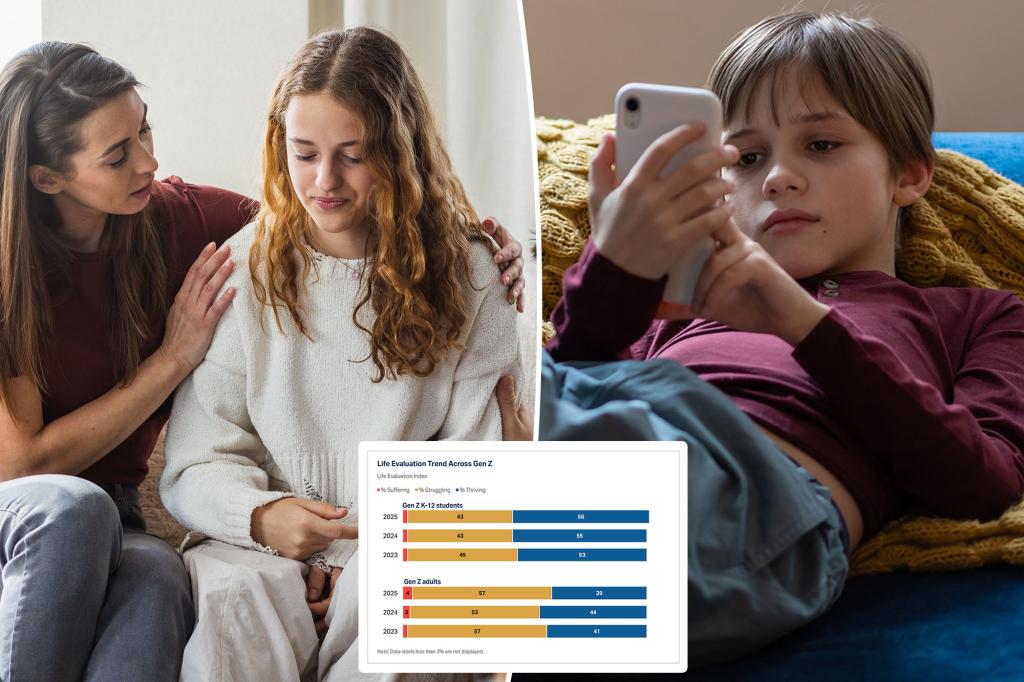Gen Z’s Happiness Divide: A Tale of Two Generations
In a time when TikTok dance challenges and social media influencers dominate youth culture, one might assume today’s young adults are living their best lives. However, the latest Gallup and Walton Family Foundation survey tells a different story. Their 2025 Voices of Gen Z study reveals a concerning trend: only 39% of Gen Z adults (ages 18-28) report they’re thriving, a 5% drop from last year. This decline is creating a stark division within the generation itself – while those who’ve entered adulthood struggle, younger Gen Zers remain in a relatively content bubble, with 56% reporting satisfaction with their lives. The findings paint a picture of a generation split by the harsh realities of adulthood versus the protected optimism of youth.
The most alarming decline appears among young adult women, with just 37% reporting life satisfaction – a dramatic drop from 46% last year. Stephanie Marken, senior partner at Gallup, points to mounting evidence that young women are battling unprecedented levels of anxiety and depression, which significantly colors their overall outlook. These mental health challenges aren’t occurring in isolation but reflect broader societal pressures. As HR consultant Bryan Driscoll bluntly puts it, “Gen Z isn’t struggling because they’re fragile or unmotivated or whatever. They’re struggling because the system is broken.” For young women especially, this broken system manifests as a triple burden: they face inequitable pay, persistent workplace sexism, and a political landscape where their fundamental rights often become political bargaining chips.
Financial reality hits particularly hard for this generation. The average Gen Zer carries approximately $94,101 in personal debt – surpassing even Millennials, who average around $59,181. Credit card debt emerges as the primary culprit, with 56% of Gen Zers carrying this financial burden. This staggering debt comes at a time when they’re trying to establish independence against a backdrop of skyrocketing housing costs, stagnant wages, and an increasingly competitive job market. Unlike previous generations who could reasonably expect to afford homes and establish financial security in their twenties, today’s young adults face a seemingly impossible economic equation – higher education costs more, pays off less, and traditional milestones of adulthood feel increasingly out of reach.
The happiness gap between younger and older Gen Zers likely reflects the protective bubble of childhood versus the harsh realities of independence. Teenagers still living at home, protected from rent increases and grocery bills, can maintain optimism about their futures. Meanwhile, their slightly older counterparts face the cold reality of an economy that seems designed to work against them. This generation entered adulthood during unprecedented global upheaval – a pandemic that disrupted education and early career opportunities, political polarization that threatens basic rights, climate anxiety about their future, and economic instability that makes long-term planning nearly impossible. Their struggles aren’t signs of weakness but rational responses to genuinely difficult circumstances.
What makes this generation’s experience unique isn’t just the challenges they face but the context in which they experience them. Unlike previous generations who might have struggled privately, Gen Z lives in an era of constant connectivity and comparison. Social media creates both community and pressure, offering support networks while simultaneously bombarding young adults with carefully curated images of success that rarely reflect reality. The American Dream that motivated earlier generations has been revealed as increasingly unattainable, creating a crisis of purpose and direction. When traditional paths to success seem blocked, it’s no wonder that life satisfaction suffers, particularly among those facing additional barriers based on gender, race, or economic background.
Despite these challenges, there’s reason for cautious optimism. Gen Z has consistently shown resilience, creativity, and determination in the face of obstacles. They’re politically engaged, environmentally conscious, and increasingly vocal about workplace rights and mental health awareness. The generation’s willingness to question established systems rather than simply accepting them might ultimately lead to necessary reforms in education, healthcare, employment, and finance. The happiness divide within Gen Z serves as a powerful indicator of where society is failing its young adults. If we want future surveys to show improvement, it will require meaningful action – not just from Gen Z themselves but from the systems and institutions that currently contribute to their struggles. Their declining well-being isn’t just their problem; it’s a societal alarm bell we would be wise to heed.


